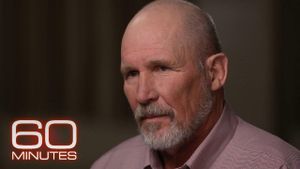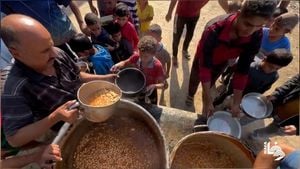Sir Brian May, famed guitarist of Queen and lifelong animal rights advocate, has stirred the pot with new research challenging the conventional wisdom around badgers and bovine tuberculosis (bTB). His findings, showcased in a recent BBC documentary titled Brian May: The Badgers, the Farmers and Me, assert significantly more responsibility lies with cattle than previously acknowledged.
The 77-year-old musician passionately stated, "Speaking out against the culling of badgers has become as important to me as music." Over ten years, he has worked alongside veterinarians and farmers to investigate the transmission of bTB, resulting in revelations he claims could shift perspectives on animal management.
More than 50,000 cattle were slaughtered within the UK last year due to bTB, with the authorities routinely testing herds to prevent the spread. May’s research posits cattle could be passing the disease among themselves, undermining claims they were merely victims of badger transmission.
A prominent veterinarian, Christianne Glossop, acknowledged the importance of May’s insights. Still, she cautioned against viewing his conclusions as definitive, explaining, "TB can arrive on a farm through dirty boots or infected slurry spread nearby, and badgers can also introduce the infection."
The culling of badgers has been contentious, especially after the UK government expanded its culling program based on claims these animals played a role in spreading bTB. Farmer Chris Mossman, who lost over 500 cattle to the disease, remarked, "It's very complex, and we can't put all our eggs in one basket. Badgers do contribute."
For more than 12 years, May has campaigned against the culling of badgers as part of the efforts to stop bTB. He expressed support for improved hygiene practices among cattle, emphasizing the need to keep disease-causing pathogens from spreading within herds.
According to May, the effective management of cattle droppings should be prioritized over the traditional view of pest control concerning badgers. He stated, "Biosecurity now means keeping the slurry away from the cows, so they can’t infect each other. Everything is within the herd."
May's documentary showcases case studies of farms where enhanced hygiene measures successfully eradicated bTB. After making adjustments to biosecurity practices, such as isolations for droppings, one Devon farm managed to become officially bTB free after four years.
His findings have sparked heated debate among farmers, veterinarians, and policymakers alike. While some experts, like Professor Paul Hunter, support May's research, insisting it demonstrates the need for broader perspectives on tackling the disease, others caution against dismissing the potential role badgers play.
Concerns have also emerged about the BBC's impartiality, especially following the commissioning of May's documentary. Critics argue this aligns poorly with BBC guidelines, calling for more balanced representation of differing views on badger culling.
May, reflecting on the controversies surrounding the documentary and animal culling, admitted feeling animosity from the farming community for his alternative perspectives. He declared, "I understand the suspicion and hostility but believe we can offer hope and change."
The question of how best to manage bTB continues to loom large over the farming industry, mainly as the UK government considers future strategies to end what many describe as ineffective badger culling. Sir Brian’s campaign pushes for the prioritization of animal welfare over widespread culling practices.
Despite the polarizing nature of May's documentary, he sees it as necessary advocacy work driven by compassion for animals, saying it reflects years of research efforts. "We can’t ignore the facts just because they are inconvenient to some," he stated, emphasizing the moral imperative of his work.
While his documentary may provoke backlash, it’s to challenge the status quo and promote dialogue around animal health. It also aims to educate viewers about the complexity of disease transmission, particularly concerning bTB, and the interconnectedness of animal health and farming practices.
A look at the broader statistical picture highlights persistent issues with bTB across the UK. Between April 2023 and March 2024 alone, England experienced over 21,000 cattle being culled due to bTB, underscoring the need for synergetic approaches to managing both animal populations and agricultural practices.
The Welsh government has expressed intent to eradicate bTB through measures including vaccination and biosecurity. Encouragingly, initiatives aimed at comprehensively addressing the disease without resorting to culling are being considered more seriously.
May's initiative takes the issue of bTB beyond conventional thinking, leading to discussions on best practices and animal welfare. Though the debate remains contentious, awareness around reforming animal management policies shows promise for meaningful change.
The documentation puts forth the idea of systematic change to align farming practices with animal health rather than “quick fixes” through culling. Moving forward, it may invoke necessary discussions around agricultural policies and animal rights.
May's advocacy is not just for badgers but for all animals affected by farming practices, and his desire to shift public consciousness is undeniable. Whether or not his findings resonate with the farming community remains to be seen, but his voice adds much-needed complexity to the debate.
The documentary premiered on BBC Two, creating ripples across the animal rights and agricultural communities, with expectation and skepticism balanced carefully. May's unwavering stance on protecting wildlife against the tide of traditional practices is part of the broader discourse on animal rights and welfare.
Reactions are already surfacing, with some farmers expressing gratitude for the attention the documentary brings to their struggles. Critics, meanwhile, adamantly defend the necessity of badger culling, citing extensive impacts on livestock.
Zoos, wildlife centers, and conservationists are watching closely, as the conversation continues to evolve post-broadcast. With renewed focus on bTB, efforts are being made to rethink how species can coexist amid human activity.
From thinking about farming practices to urges for wildlife preservation, there’s growing recognition of the intertwined fates between agriculture and the natural world. The outcome of these dialogues may shape how policies on wildlife and farming operate going forward.
At the core, May's documentary urges society to re-examine its relationship with wildlife. This reevaluation promises to spark future debates as society seeks balance between agricultural necessity and wildlife preservation.



